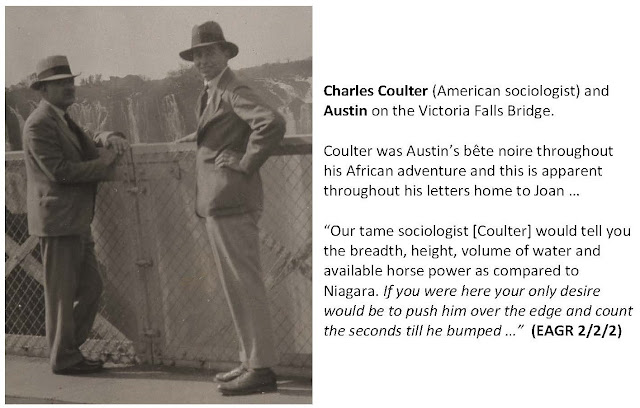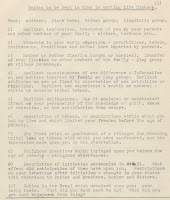The Marshall Library is fortunate in that it possesses the published output of many prominent Cambridge economists together with their archives. The latter often given an insight into the efforts - and sometimes hardships - that were involved in the production of certain works. This is the case with 'Modern industry and the African' published in 1933 by the International Missionary Council. Austin Robinson authored several of its chapters following extensive travels in Northern Rhodesia and the Belgian Congo in 1932 as part of a Commission charged with undertaking research into the effects of industrialization on native African society.
In order to accomplish this fieldwork Austin was often confined in a car with his fellow Commission members, whose backgrounds, views and approaches to fieldwork were very different, while they travelled 12,000 miles slowly and uncomfortably over rough dirt roads in an inhospitable climate. The letters that Austin sent home to Joan at this time - plus the numerous photographs he took while in Africa - are all preserved in the Marshall Library archives and will be used in this and subsequent blogs to illustrate what was involved in producing 'Modern industry and the African.' Austin records all the personality clashes among the Commission members, the contrasting approaches to fieldwork and the arduous travelling conditions with his characteristic dry wit and humour.
The first part of this blog series will examine the background and composition of the Commission followed by a description of the route and travelling condition and finally an examination of Austin's chapters in 'Modern industry and the African.'
Background and composition of the Commission
The main objective of the Commission of Enquiry sent to Africa in 1932 by the International Missionary Council was to prepare a report on the impact of copper mining in Northern Rhodesia and the Belgian Congo on native society. To complete this work six individuals - including Austin - were recruited from a variety of different backgrounds and nationalities. The Reverend J. Merle Davis, an American missionary with considerable practical and administrative experience, led the group. It is obvious from Austin's letters that he had great respect for Davis and his abilities. Comparing him to his fellow commission members Austin wrote "... he is not an academic ... but his judgement is in many respects the soundest" (EAGR 2/2/2/6)The other Commission members were Leo Marquard (Dutch history master at Bloemfontain School), Charles Coulter (Professor of Sociology, Ohio Western Univesity), Ray Phillips (Johannesburg missionary) and Mabel Shaw (Principal of a girl's school in Northern Rhodesia).
However it was for Coulter, '... the raw middle west American ... capable of being dogmatically irritating beyond all description' that Austin reserved his most acerbic comments. (EAGR 2/2/2/8). According to Austin Coulter '... knows his subject backwards without ... having the faintest glimmering of what it is all about (EAGR 2/2/2/7). In particular Austin was '... afraid of him bogging us [the Commission] in a mire of semi-technical, half-digested anthropological-sociological-psychological-physiological-semi-logical bunk' (EAGR 2/2/25).
These were Austin's colleagues on a car journal that would cover 12,000 miles, in a hostile climate, on mostly unpaved African roads.
The next blog in this series will examine the route that the Commission took through South Africa, Northern Rhodesia and the Belgian Congo and the travelling conditions that they endured.






